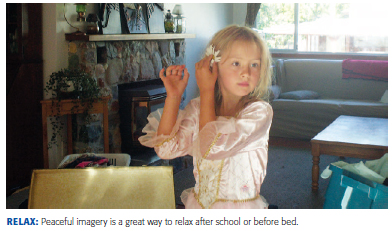Back to school
The 3 Rs revisited
By Michelle Thomas, Chris McPhee & Anneke Gutter
Starting school again (or for the first time) can bring a mix of excitement and trepidation for most families. There are many tasks to complete and each day has a new set of variables. Information arrives through our senses and we need to direct our bodies to respond in new and different ways. Learning can be fun and exciting but for many children, learning and the school environment can be overwhelming. To help our children do their best with the tasks of Reading, wRiting and aRithmetic, let's take another look at the three Rs of developmental performance, rest, routines and relaxation.
Rest
Establishing healthy sleep patterns early on is critical for learning. Parents need to guide their children in developing healthy sleep habits from infancy forward.
By school age, children with poor sleep patterns tend to have significantly higher rates of:
· Hyperactivity and inattention
· Poor memory and learning (we organize and store information while sleeping)
· Difficulty performing learning tasks (delayed responses)
· Withdrawn or aggressive behaviours
· Difficulty regulating emotions
· Physical complaints and injuries
· Anxiety (due to higher waking brain cortisol levels)
In general, children need an average of 10 hours of sleep per night; teens need 8 to 9.5 hours. Recent research has linked poor sleep patterns to higher use of drugs and alcohol in adolescence.
Some strategies for supporting healthy sleep patterns include:
· Consistent day and night routines
· Keep bedrooms technology free
· Eliminate foods and drinks with caffeine after noon
· Two hours before bed eliminate TV, computers, exercise and exciting play.
· Develop and maintain a familiar short bedtime routine (snack, bath, story, song).
· Play quiet music in the evening then switch to "white noise" at lights-out (a radio turned down and off-station) may help to promote sleep.
· Give infants a shirt worn for several days by a parent for the comforting smell.
· Give toddlers soft stuffies and blankets that smell like the parent.
· Let children and teens pick their own sheets and pillowcases based on favourite textures such as fleece, flannel, or silky smooth.
Routines
Bedtime routines help kids (and parents) relax at the end of the day and prepare the body for sleep.
Morning routines get the day off to a good start, so allow enough time so mornings are relaxing and fun, not rushed. Doing some tasks, like preparing lunches, the night before can free up time in the morning.
Eat a nutritious breakfast (if the body is lacking food or nutrition, the brain cannot focus on anything else--especially new learning).
Leave the TV off. Help kids jump-start their brains with creative fun.
Every child needs time for exercise and play. Walking to school is one of the best ways to start your day. Walking helps to stimulate the brain-body connection to improve listening, looking and fine motor skills.
Prioritize your activities to include fun movement every day. Active motion builds the brain-body connections necessary for learning. Endorphin release that occurs following physical activity is nature's gift to help you manage stress.
Provide opportunity for rough and tumble play every day. Children need this type of play to develop all of the sensory processing systems that are necessary for reading, writing and attending to tasks.
Relaxation
Spending time interacting with your child is the most important thing you can do.
Listen when your child talks, and show your child that you love them with words, hugs, and kisses.
Get active together as a family.
Turn off the technology. Although technology is an important part of our world, the passive sensory overstimulation that occurs while children watch TV or play video games creates damaging developmental outcomes. Increases in attention difficulties, poor academic achievement, aggressive behaviour, obesity, sleep disorders, and relational disconnection are linked to the overuse (more than one hour per day) of technology.
Keep bedrooms technology free. A bedroom is a place for rest and quiet relaxation.
Help your children develop interests free of technology (sports, games, crafts, reading, drawing, dancing).
Help your children relax--a brain that is calm and in control is ready to sort and process new information. Structured relaxation helps us feel good and we behave better when we feel good. Following an after school snack with 15 minutes of relaxation time will relieve stress and help children focus on homework tasks. If the child does not have homework, a short relaxation time will set the stage so the brain can sort and organize the new information that was learned during the day.

Specific strategies include:
· Listen to calming music. Breathe deeply. Take a warm bath.
· Create a quiet retreat place so your child has their own special "get away" spot: snuggle in a sleeping bag, beanbag chair, large pillow or closet fort.
· Reduce noise and light levels (turn off TV, lights).
· Provide deep pressure: comfortable back rubs, shoulder squeezes, or comfortable "big squish" hugs.
Every day is full of fast-paced choices. To help our children achieve their highest potential we need to maintain balance with rest, routines, and relaxation.